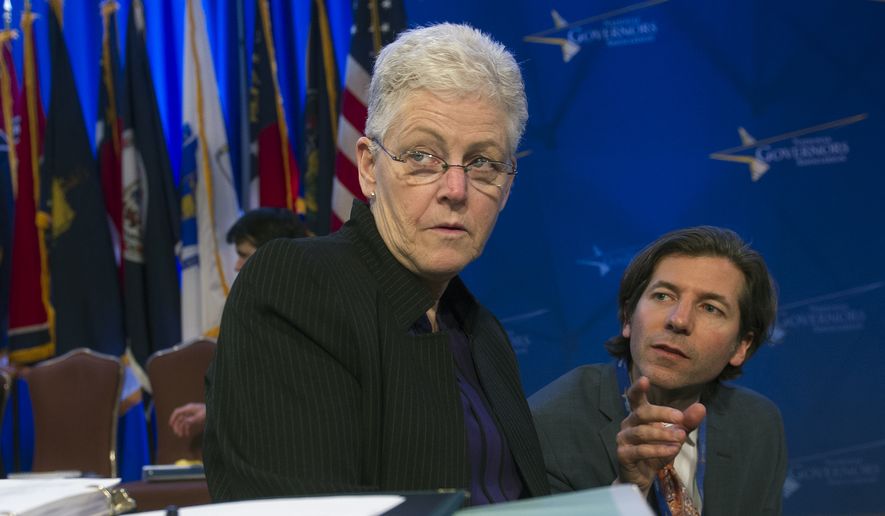A federal judge warned the EPA on Monday not to discriminate against conservative groups in how it responds to open-records requests, issuing a legal spanking to the agency that he said may have lied to the court and showed “apathy and carelessness” in carrying out the law.
Judge Royce C. Lamberth said he couldn’t prove that officials intentionally destroyed documents, but he described as “absurdity” the way the Environmental Protection Agency handled a Freedom of Information Act request from the Landmark Legal Foundation and then the court case stemming from it — including late last week admitting that it misled the court about how it went about searching for documents.
In a scorching 25-page opinion, the judge accused the agency of insulting him by first claiming it had conducted a full search for records, then years later retracted that claim in a footnote to another document without giving any explanation for how it erred.
“The recurrent instances of disregard that EPA employees display for FOIA obligations should not be tolerated by the agency,” the judge said. “This court would implore the executive branch to take greater responsibility in ensuring that all EPA FOIA requests — regardless of the political affiliation of the requester — are treated with equal respect and conscientiousness.”
The ruling could be seen as a rebuke to President Obama, who took office vowing to run the most transparent administration in history but has faced increasing challenges over how he has lived up to that claim. The EPA in particular has been in a yearslong battle with conservative groups that argue the agency has ignored them while playing favorites with liberal groups.
Judge Lamberth pointedly noted that the EPA delayed some of its follow-through on the request by Landmark until after the 2012 elections and said explanations by several EPA officials for why they failed to live up to the law defied reason.
Agency spokeswoman Liz Purchia said the EPA was happy that Judge Lamberth didn’t punish it further. She also vowed that her agency would try to do better on open-records requests.
“EPA is focused on creating more efficient work processes to ensure FOIAs responses are done more effectively and at a lower cost,” she said, adding that the agency would look into cloud computing and mobile technology to help.
Mark Levin, president of Landmark, said the EPA is lucky the judge didn’t go further. He said it is now up to the administration to decide how to punish the agency, though he isn’t holding much hope for that prospect.
“What the administration should do, when a federal judge issues an opinion like this, is fire people,” said Mr. Levin, who hosts a popular radio show. “What this admin will no doubt do is throw a party.”
Judge Lamberth singled out the actions of two employees.
One, Nena Shaw, he said, either showed “utter indifference” to the law or lied to the court about the efforts she made to provide records to Landmark.
The other, Eric W. Wachter, a key EPA official identified as overseeing the open-records search, told the court several years ago that he had conducted a thorough search for records Landmark requested. On Friday, however, the Justice Department quietly retracted those assertions.
Ronald C. Machen, the U.S. attorney for the District of Columbia, said Mr. Wachter was acting in good faith throughout and that the EPA never claimed it had conducted the search correctly, so Mr. Wachter didn’t lie to the court.
Mr. Wachter didn’t respond to an email Monday seeking comment.
Landmark was trying to get a peek at EPA communications with outsiders as the agency was writing rules and regulations in 2012. The EPA slow-walked the request, forcing Landmark to sue.
Mr. Levin said it was apparent from the beginning that the EPA was trying to obstruct, rather than cooperate with, the request for documents.
Judge Lamberth said the EPA was either lying or incompetent at several turns in how it handled the situation in terms of the search and its response to the court case.
“Either EPA intentionally sought to evade Landmark’s lawful FOIA request so the agency could destroy responsive documents, or EPA demonstrated apathy and carelessness toward Landmark’s request,” Judge Lamberth said. “Either scenario reflects poorly upon EPA and surely serves to diminish the public’s trust in the agency.”
Because Landmark couldn’t prove intentional bad faith, the judge said, it wasn’t entitled to “spoliation sanctions.” Neither could he find a reason to impose criminal sanctions against the agency.
Judge Lamberth also refused to appoint an independent monitor to oversee the EPA’s open-records requests. He said that was an “extreme and legally uncertain” alternative, but his frustration with the situation showed repeatedly.
“The court is left wondering whether EPA has learned from its mistakes, or if it will merely continue to address FOIA requests in the clumsy manner that has seemingly become its custom,” the judge wrote. “Given the offensively unapologetic nature of EPA’s recent withdrawal notice … the court is not optimistic that the agency has learned anything.”
Judge Lamberth’s admonition against discriminating against conservative groups comes in the middle of a heated debate between the agency and those groups.
Conservatives produced a 2013 study finding that their requests for fee waivers under open-records requests were denied about 90 percent of the time, while liberal interest groups’ fee-waiver requests were approved 90 percent of the time.
Christopher Horner, a researcher who regularly battles the EPA over open-records requests and who helped craft that 2013 study, said Judge Lamberth’s ruling was a vindication and should undercut the EPA’s inspector general, who last year conducted an investigation that cleared the EPA of bias in its fee-waiver process.
• Stephen Dinan can be reached at sdinan@washingtontimes.com.




Please read our comment policy before commenting.